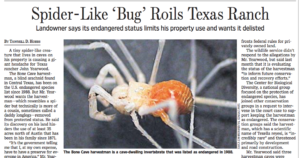Tawnell D. Hobbs reported in today’s Wall Street Journal that, “A tiny spider-like creature that lives in caves on his property is causing a giant headache for Texas rancher John Yearwood.
“The Bone Cave harvestman, a blind arachnid found in Central Texas, has been on the U.S. endangered species list since 1988.
“But Mr. Yearwood wants the harvestman—which resembles a spider but technically is more of a cousin sometimes called a daddy longlegs—removed from protected status. He said its discovery on his land hinders the use of at least 35 acres north of Austin that has been in his family since 1871.”

From the January 6 edition of the Wall Street Journal.
Today’s article noted that, “‘It’s the government telling me that I, at my own expense, have to have a preserve for everyone in America,’ Mr. Yearwood said. ‘I pay taxes on the land every year. And there’s no way I can sell it—nobody will buy it.’
“Federal law prohibits modifications or degradation of habitats of endangered species that could impact their breeding, feeding or sheltering, except under federal permit. Those permits are mostly available for conservation and scientific purposes. Harming or harassing the species, physically or through noise or light is also prohibited.”
Today’s article added that, “[Mr. Yearwood] and other property owners have filed a lawsuit against the U.S. Fish and Wildlife Service, which oversees endangered species rules, to delist the harvestman, saying it isn’t endangered and is unnecessarily restricting use of their property. Mr. Yearwood’s suit also contends that the federal government is exceeding its authority by regulating ‘noneconomic activity.’
“Last month, the state of Texas threw support behind Mr. Yearwood in a friend-of-court brief filed in U.S. District Court in the Western District of Texas, calling the situation a ‘clear overreach in the use of federal power.’
“The rancher’s dilemma is a peculiar example of broader tensions in the West over federal oversight of land. In this case, the conflict confronts federal rules for privately owned land.”

